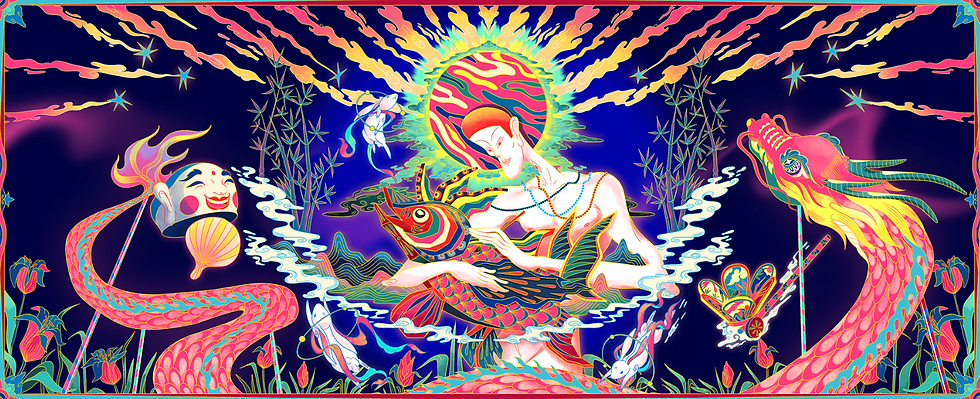individual's course outline
- Anh Quynh Do (Yr.23-25)
- Oct 24, 2023
- 3 min read
Updated: Jan 9, 2024
Name: Anh Quynh Do
Language: Vietnamese
Part 1: First-year book choice:
1. Đau thương - Hàn Mặc Tử
Agony, or Madman's Poems, consists of 43 poems, published in 1937. The collection is divided into three chapters: Fragrance, Bitter Nectar, and Raging Blood & Deranged Soul. Written in his eternal stay in the exclusion camp amidst the spread of leprosy, the work encapsulates affection, desire, and torment. Agony is also regarded as a timeless archetype of supernaturalism, impressionism, and romanticism in contemporary Vietnamese literature.
2. Chuyện ở nông trại - George Orwell
Animal Farm, published in 1945, is an anti-utopian satire by George Orwell, based on the Bolshevik revolution in Russia and Joseph Stalin's betrayal. The story follows a group of barnyard animals who overthrow their human masters and establish an egalitarian society. However, the pigs, who believe all animals are equal, subvert the revolution, leading to an oppressive dictatorship.
3. Những người phụ nữ bé nhỏ - Louisa May Alcott
Little Women by Louisa May Alcott, published in 1868, has left an indelible mark on contemporary American culture. The novel's timeless quotes resonate in various art forms, from film to theater, and find a place in everyday conversations. Through the character Jo March, Alcott explores societal shifts during the 19th century, addressing themes of familial bonds, gender roles, and societal expectations. Jo's journey reflects the changing dynamics of her time, making her a lasting figure in American literature and cultural discussions.
4. Số đỏ - Vũ Trọng Phụng
Dumb Luck is a novel published in 1938, in which many quotes have laced into contemporary Vietnamese cultural fabric, making its way into films, plays, and colloquial expressions. From being a person considered low-class, the main character Xuân Tóc Đỏ (Red-haired Xuân) suddenly jumped to Hanoi's most prestigious class thanks to the Europeanization trend of the city's petty bourgeoisie.
5. Hà Nội băm sáu phố phường - Thạch Lam
Published in 1943, Thirty-six streets of Hanoi is a chronicles consisting of twenty newspaper article written by Thach Lam, compiled posthumously. The chronicle captures the mesmerizing nuances in the Hanoian way of life: the gestures, the scenaries, and the cuisine. It is recalled as rays of light beautifying retrospection of Old Hanoi, the love comparable to that of a Parisian or Londoner.
Part 2: Second-year book choice:
1. Một thoáng ta rực rỡ ở nhân gian - Ocean Vuong
On Earth We're Briefly Gorgeous by Ocean Vuong is a novel written as a letter from a son to his illiterate mother. The narrative is a poignant exploration of identity, family, and the complexities of the immigrant experience. The protagonist, Little Dog, reflects on his Vietnamese-American heritage, grappling with the challenges of assimilation, cultural expectations, and the scars of intergenerational trauma. The novel weaves together themes of love, sexuality, and the search for belonging, creating a lyrical and deeply emotional portrayal of the human experience. Vuong's prose is poetic and introspective, offering readers a unique and intimate perspective on the struggles and triumphs of a young man coming to terms with his identity and the world around him.
2. Rừng Na Uy - Haruki Murakami
Norwegian Wood was written by Japanese author Haruki Murakami in 1987. The book is a melancholy tale of bereavement. The story is told in the first person by Toru Watanabe, who reflects on his time spent living in Tokyo as a college student. Readers witness Watanabe's relationships with two very different women—the gorgeous but unstable Naoko and the gregarious, vivacious Midori—through his memories.
3. Thơ thơ - Xuân Diệu
Thơ thơ, published in 1938, consists of forty-six romantic poems, of which recurring theme encapsulates love, youth, and taboos. Influenced by French stylistics, Xuan Dieu's work came under disputes on matters regarding homosexuality and Western fetishization.
4. Tuyển tập thơ Hồ Xuân Hương
Hồ Xuân Hương (1772–1822) was a Vietnamese poet born at the end of the Lê dynasty. She wrote poetry using chữ Nôm, which adapts Chinese characters for writing demotic Vietnamese. She is considered to be one of Vietnam's greatest classical poets. Xuân Diệu, a prominent modern poet, dubbed her "The Queen of Nôm poetry". Her works revolve around critiques of the Confucianist gender hierarchy, sexuality, and womanhood.





Comments